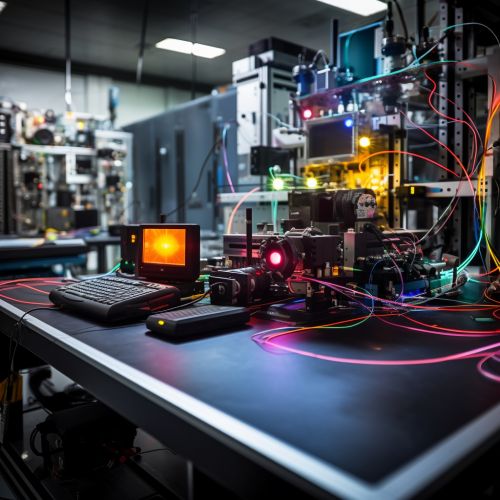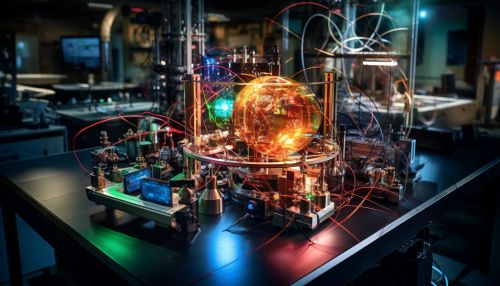Analog quantum simulators
Introduction
Analog quantum simulators are a class of quantum computers that are designed to simulate and study complex quantum systems. They are a type of quantum simulator that uses a controllable quantum system to mimic an uncontrolled quantum system. This is achieved by mapping the dynamics of the system being simulated onto the dynamics of the controllable system. Analog quantum simulators are a powerful tool for studying quantum phenomena that are difficult to study in other ways, such as quantum phase transitions and quantum many-body systems.


History and Development
The concept of quantum simulation was first proposed by Feynman in 1982. He suggested that a quantum computer could be used to simulate quantum systems, which would be a significant advancement over classical computers, which struggle with this task due to the exponential growth of the state space with the number of particles. The idea of analog quantum simulation, specifically, was developed further in the 1990s and early 2000s by researchers such as Seth Lloyd and David Deutsch.
Principles of Operation
Analog quantum simulators operate by using a controllable quantum system to simulate another, less controllable quantum system. This is achieved by engineering the Hamiltonian of the controllable system to match that of the system being simulated. The Hamiltonian is a mathematical operator that describes the total energy of a quantum system, and it plays a central role in the Schrödinger equation, which describes the time evolution of quantum systems.
The controllable quantum system used in an analog quantum simulator can be any system that can be manipulated at the quantum level, such as ultracold atoms in optical lattices, ions in ion traps, or superconducting circuits. The choice of system depends on the specific requirements of the simulation.
Applications
Analog quantum simulators have a wide range of applications in quantum physics research. They can be used to study quantum phase transitions, quantum many-body systems, topological states of matter, and other complex quantum phenomena. They can also be used to simulate the behavior of quantum materials and quantum devices, which can be useful in the development of new quantum technologies.
Challenges and Limitations
While analog quantum simulators are a powerful tool for studying quantum systems, they also have a number of challenges and limitations. One of the main challenges is the need for precise control over the quantum system, which can be difficult to achieve in practice. Another challenge is the issue of quantum decoherence, which can cause the quantum system to lose its quantum properties over time.
In terms of limitations, analog quantum simulators are limited to simulating systems that can be mapped onto the controllable quantum system. This means that they may not be able to simulate all quantum systems. Furthermore, they are typically limited to simulating relatively small systems, due to the practical limitations of scaling up quantum systems.
Future Prospects
Despite these challenges and limitations, the field of analog quantum simulation is rapidly advancing, and there are many exciting prospects for the future. With ongoing improvements in quantum control and error correction techniques, it is expected that analog quantum simulators will be able to simulate increasingly complex and large-scale quantum systems. This could open up new possibilities for studying quantum phenomena and developing quantum technologies.
